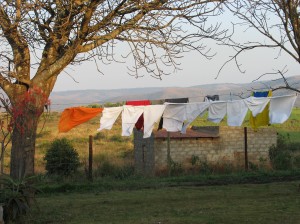A FAITH WITH FEET
 How to articulate the Unitarian Universalist message more succinctly? When asked the question, “What is it you guys actually believe?”, the response is often times begun with “well”, “um”, or an occasional pontificating that renders the listener bleary eyed.
How to articulate the Unitarian Universalist message more succinctly? When asked the question, “What is it you guys actually believe?”, the response is often times begun with “well”, “um”, or an occasional pontificating that renders the listener bleary eyed.
Of course, the question itself is a misguided one. You do not have to share a certain belief or set of beliefs to be a part of our liberal free thinking faith tradition. Instead, a soundbite answer (which our culture has a penchant for) is this: “We are a faith with feet.” A cornerstone of modern Unitarian Universalism is SOCIAL ACTION. We place great value on living out our faith in works of love and justice and efforts on behalf of the most marginalized in society.
 It is well for us to remember this. One of the major forces in 20th century theology, a tireless proponent of social action and volunteerism was Unitarian minister, social activist, writer, and scholar James Luther Adams (1901-1994).
It is well for us to remember this. One of the major forces in 20th century theology, a tireless proponent of social action and volunteerism was Unitarian minister, social activist, writer, and scholar James Luther Adams (1901-1994).
A Harvard and Andover Newton professor for decades, popular with his students for his unabashed passion and candor, Adams vehemently fought against the tendency of religious liberals to be theologically content with vague slogans and platitudes about open-mindedness. He believed, having witnessed the atrocities of WWII, that liberal churches must dig a little deeper or they would be rendered irrelevant and impotent in face of the world’s evil. He stated this conviction loudly and frequently.
 Adams advocated volunteerism across a broad spectrum of issues as a powerful and necessary component of an authentically free spirit in a free church. He penned many essays and articles focusing on the theology of voluntary associations and social ethics, on topics ranging from politics to the grotesque in the arts to AIDS.
Adams advocated volunteerism across a broad spectrum of issues as a powerful and necessary component of an authentically free spirit in a free church. He penned many essays and articles focusing on the theology of voluntary associations and social ethics, on topics ranging from politics to the grotesque in the arts to AIDS.
He spoke with his feet as well. Adams was interrogated by the Gestapo and almost thrown in prison while in Germany under the Third Reich for his association with the Underground Church Movement. Using a home movie camera, he filmed Karl Barth, Albert Schweitzer, and others, to spread the underground resistance to the Nazi regime.
 At home, he worked tirelessly for an independent grassroots political organization whose goal was open and honest government. He interpreted participation in voluntary associations, whatever the character of the government, as the chief means by which beneficial social change has been effected throughout history, and as key to the meaning of human history.
At home, he worked tirelessly for an independent grassroots political organization whose goal was open and honest government. He interpreted participation in voluntary associations, whatever the character of the government, as the chief means by which beneficial social change has been effected throughout history, and as key to the meaning of human history.
James Luther Adams described the free church as “a body of believers freely joined in a covenant of loyalty to the holy spirit of love, intentionally inclusive of dissent, governed by its own members and fiercely independent from government control, with the reign of the spirit of love among members to be seen in their voluntary assumption of responsibility for the just character of their whole society.”
His influence continues to extend to the many institutions his former students of many faith traditions now serve, some with high distinction. He was impatient with lifeless abstraction and wanted to know what you were DOING, what are your stories, about how your service work is working or not, what are the struggles?
This is at the heart of our Unitarian Universalist faith. To be worthy of our rich religious history, we must strive to be nothing less than a faith which is intellectually accountable and moves the spirit to action. Pledge to be doing something that calls to your heart and helps to heal the world.


